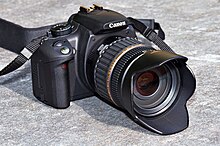 |
| 3D (left and center) and 2D (right) representations of the terpenoid molecule atisane |
Selasa, 30 Oktober 2012
Molecule (Chemistry)
A molecule ( /ˈmɒlɪkjuːl/) is an electrically neutral group of two or more atoms held together by covalent chemical bonds. Molecules are distinguished from ions by their lack of electrical charge. However, in quantum physics, organic chemistry, and biochemistry, the term molecule is often used less strictly, also being applied to polyatomic ions.
/ˈmɒlɪkjuːl/) is an electrically neutral group of two or more atoms held together by covalent chemical bonds. Molecules are distinguished from ions by their lack of electrical charge. However, in quantum physics, organic chemistry, and biochemistry, the term molecule is often used less strictly, also being applied to polyatomic ions.
Diposting oleh
Unknown
di
00.48
0
komentar
Kirimkan Ini lewat Email
BlogThis!
Bagikan ke X
Berbagi ke Facebook

Label:
Adaktif
Trigonometry (Mathematics)
Trigonometry (from Greek trigōnon "triangle" + metron "measure") is a branch of mathematics that studies triangles and the relationships between their sides and the angles between these sides. Trigonometry defines the trigonometric functions,
which describe those relationships and have applicability to cyclical
phenomena, such as waves. The field evolved during the third century BC
as a branch of geometry used extensively for astronomical studies. It is also the foundation of the practical art of surveying.
 |
| The Canadarm2 robotic manipulator on the International Space Station is operated by controlling the angles of its joints. Calculating the final position of the astronaut at the end of the arm requires repeated use of trigonometric functions of those angles. |
Diposting oleh
Unknown
di
00.30
0
komentar
Kirimkan Ini lewat Email
BlogThis!
Bagikan ke X
Berbagi ke Facebook

Label:
Adaktif
Senin, 22 Oktober 2012
Probability (Mathematics)
Probability is a measure of the expectation that an event will
occur or a statement is true. Probabilities are given a value between 0
(will not occur) and 1 (will occur). The higher the probability of an event, the more certain we are that the event will occur.
The concept has been given an axiomatic mathematical derivation in probability theory, which is used widely in such areas of study as mathematics, statistics, finance, gambling, science, artificial intelligence/machine learning and philosophy to, for example, draw inferences about the expected frequency of events. Probability theory is also used to describe the underlying mechanics and regularities of complex systems.
The concept has been given an axiomatic mathematical derivation in probability theory, which is used widely in such areas of study as mathematics, statistics, finance, gambling, science, artificial intelligence/machine learning and philosophy to, for example, draw inferences about the expected frequency of events. Probability theory is also used to describe the underlying mechanics and regularities of complex systems.
 |
Probability
|
Diposting oleh
Unknown
di
22.36
0
komentar
Kirimkan Ini lewat Email
BlogThis!
Bagikan ke X
Berbagi ke Facebook

Label:
Adaktif
Minggu, 21 Oktober 2012
Filmmaking
 |
| A film being made in Warsaw, Bracka street |
Diposting oleh
Unknown
di
20.33
0
komentar
Kirimkan Ini lewat Email
BlogThis!
Bagikan ke X
Berbagi ke Facebook

Label:
Produktif
Pre-production
Diposting oleh
Unknown
di
20.29
0
komentar
Kirimkan Ini lewat Email
BlogThis!
Bagikan ke X
Berbagi ke Facebook

Label:
Produktif
Cinematic techniques
Basic definitions of terms
Aerial shot: A shot taken from a plane, helicopter or a person on top of a building. Not necessarily a moving shot.Backlighting: The main source of light is behind the subject, silhouetting it, and directed toward the camera.
Bridging shot: A shot used to cover a jump in time or place or other discontinuity. Examples are falling calendar pages, railroad wheels, newspaper headlines, and seasonal changes
Camera angle: The angle at which the camera is pointed at the subject: Low High Tilt
Cut: The splicing of 2 shots together. this cut is made by the film editor at the editing stage of a film. Between sequences the cut marks a rapid transition between one time and space and another, but depending on the nature of the cut it will have different meanings.
Diposting oleh
Unknown
di
20.27
0
komentar
Kirimkan Ini lewat Email
BlogThis!
Bagikan ke X
Berbagi ke Facebook

Label:
Produktif
Audio engineering
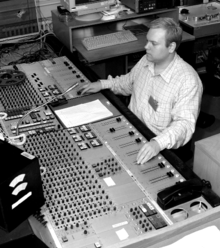 |
| An audio engineer at an audio console. |
Audio engineering concerns the creative and practical aspects of sounds and music, in contrast with the formal engineering discipline known as acoustical engineering. Producer, engineer, mixer Phil Ek has described audio engineering as the "technical aspect of recording—the placing of microphones, the turning of pre-amp knobs, the setting of levels. The physical recording of any project is done by an engineer... the nuts and bolts." Many recording engineers also invented new technology, equipment and techniques, to enhance the process and art.
Diposting oleh
Unknown
di
20.22
0
komentar
Kirimkan Ini lewat Email
BlogThis!
Bagikan ke X
Berbagi ke Facebook

Label:
Produktif
Film editing
Film editing is part of the creative post-production process of filmmaking. The term film editing is derived from the traditional process of working with film, but now it increasingly involves the use of digital technology.
The film editor works with the raw footage, selecting shots and combining them into sequences to create a finished motion picture. Film editing is described as an art or skill, the only art that is unique to cinema, separating filmmaking from other art forms that preceded it, although there are close parallels to the editing process in other art forms like poetry or novel writing. Film editing is often referred to as the "invisible art" because when it is well-practiced, the viewer can become so engaged that he or she is not even aware of the editor's work. On its most fundamental level, film editing is the art, technique, and practice of assembling shots into a coherent sequence. The job of an editor isn’t simply to mechanically put pieces of a film together, cut off film slates, or edit dialogue scenes. A film editor must creatively work with the layers of images, story, dialogue, music, pacing, as well as the actors' performances to effectively "re-imagine" and even rewrite the film to craft a cohesive whole. Editors usually play a dynamic role in the making of a film.
The film editor works with the raw footage, selecting shots and combining them into sequences to create a finished motion picture. Film editing is described as an art or skill, the only art that is unique to cinema, separating filmmaking from other art forms that preceded it, although there are close parallels to the editing process in other art forms like poetry or novel writing. Film editing is often referred to as the "invisible art" because when it is well-practiced, the viewer can become so engaged that he or she is not even aware of the editor's work. On its most fundamental level, film editing is the art, technique, and practice of assembling shots into a coherent sequence. The job of an editor isn’t simply to mechanically put pieces of a film together, cut off film slates, or edit dialogue scenes. A film editor must creatively work with the layers of images, story, dialogue, music, pacing, as well as the actors' performances to effectively "re-imagine" and even rewrite the film to craft a cohesive whole. Editors usually play a dynamic role in the making of a film.
Diposting oleh
Unknown
di
20.16
0
komentar
Kirimkan Ini lewat Email
BlogThis!
Bagikan ke X
Berbagi ke Facebook

Label:
Produktif
Graphics software
In computer graphics, graphics software or image editing software is a program or collection of programs that enable a person to manipulate visual images on a computer.
Computer graphics can be classified into two distinct categories: raster graphics and vector graphics. Many graphics programs focus exclusively on either vector or raster graphics, but there are a few that combine them in interesting ways. It is simple to convert from vector graphics to raster graphics, but going the other way is harder. Some software attempts to do this.
In addition to static graphics, there are animation and video editing software.
Most graphics programs have the ability to import and export one or more graphics file formats. It also can export files to one or more files. Computer graphics also can be used by other editing software such as Adobe Photoshop, Pizap, Microsoft Publisher, Picasa and etc. Other software that can be used is animation software, video editor software such as Windows Movie Maker etc.
The use of a swatch is a palette of active colours that are selected and rearranged by the preference of the user. A swatch may be used in a program or be part of the universal palette on an operating system, it is used to change the colour of a project, that may be text, image or video editing. Vector graphics animation can be described as a series of mathematical transformations that are applied in sequence to one or more shapes in a scene. Raster graphics animation works in a similar fashion to film-based animation, where a series of still images produces the illusion of continuous movement.
Computer graphics can be classified into two distinct categories: raster graphics and vector graphics. Many graphics programs focus exclusively on either vector or raster graphics, but there are a few that combine them in interesting ways. It is simple to convert from vector graphics to raster graphics, but going the other way is harder. Some software attempts to do this.
In addition to static graphics, there are animation and video editing software.
Most graphics programs have the ability to import and export one or more graphics file formats. It also can export files to one or more files. Computer graphics also can be used by other editing software such as Adobe Photoshop, Pizap, Microsoft Publisher, Picasa and etc. Other software that can be used is animation software, video editor software such as Windows Movie Maker etc.
The use of a swatch is a palette of active colours that are selected and rearranged by the preference of the user. A swatch may be used in a program or be part of the universal palette on an operating system, it is used to change the colour of a project, that may be text, image or video editing. Vector graphics animation can be described as a series of mathematical transformations that are applied in sequence to one or more shapes in a scene. Raster graphics animation works in a similar fashion to film-based animation, where a series of still images produces the illusion of continuous movement.
Diposting oleh
Unknown
di
20.05
0
komentar
Kirimkan Ini lewat Email
BlogThis!
Bagikan ke X
Berbagi ke Facebook

Label:
Produktif
Illustration
 |
| Illustration by Jessie Willcox Smith. |
Diposting oleh
Unknown
di
20.03
0
komentar
Kirimkan Ini lewat Email
BlogThis!
Bagikan ke X
Berbagi ke Facebook

Label:
Produktif
Digital photography
 |
| Nikon D700 — a 12.1 megapixel full-frame DSLR |
 |
| The Canon PowerShot A95 |
Until the advent of such technology, photographs were made by exposing light sensitive photographic film, and used chemical photographic processing to develop and stabilize the image. By contrast, digital photographs can be displayed, printed, stored, manipulated, transmitted, and archived using digital and computer techniques, without chemical processing.
Digital photography is one of several forms of digital imaging. Digital images are also created by non-photographic equipment such as computer tomography scanners and radio telescopes. Digital images can also be made by scanning other photographic images.
Diposting oleh
Unknown
di
19.56
0
komentar
Kirimkan Ini lewat Email
BlogThis!
Bagikan ke X
Berbagi ke Facebook

Label:
Produktif
Image editing
 |
| A colorized version of originally black and white photo, colorized using GIMP |
 |
| Original black and white photo: Migrant Mother, showing Florence Owens Thompson, taken by Dorothea Lange in 1936. |
Diposting oleh
Unknown
di
19.23
0
komentar
Kirimkan Ini lewat Email
BlogThis!
Bagikan ke X
Berbagi ke Facebook

Label:
Produktif
Editing
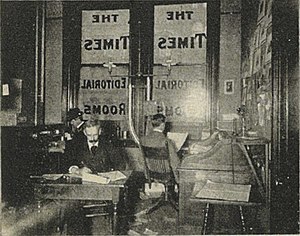 |
| "Quarters of the news editor", one a group of four photos in the brochure Seattle and the Orient (1900) collectively captioned "The Seattle Daily Times—Editorial Department" |
The editing process often begins with the author's idea for the work itself, continuing as a collaboration between the author and the editor as the work is created. As such, editing is a practice that includes creative skills, human relations, and a precise set of methods.
Diposting oleh
Unknown
di
19.00
0
komentar
Kirimkan Ini lewat Email
BlogThis!
Bagikan ke X
Berbagi ke Facebook

Label:
Produktif
Sabtu, 20 Oktober 2012
Footage
In filmmaking and video production, footage is the raw, unedited material as it had been originally filmed by movie camera or recorded by a video camera which usually must be edited to create a motion picture, video clip, television show or similar completed work. More loosely, footage can also refer to all NSK sequences used in film and video editing, such as special effects and archive material (for special cases of this, see stock footage and B roll). Since the term originates in film, footage is only used for recorded images, such as film stock, videotapes or digitized clips – on live television, the signals from video cameras are called sources instead.
Diposting oleh
Unknown
di
14.50
0
komentar
Kirimkan Ini lewat Email
BlogThis!
Bagikan ke X
Berbagi ke Facebook

Label:
Produktif
Multimedia
Multimedia is media and content that uses a combination of different content forms.
This contrats with media that use only rudimentary computer displays
such as text-only or traditional forms of printed or hand-produced
material. Multimedia includes a combination of text, audio, still images, animation, video, or interactivity content forms.
Multimedia is usually recorded and played, displayed, or accessed by information content processing devices, such as computerized and electronic devices, but can also be part of a live performance. Multimedia devices are electronic media devices used to store and experience multimedia content. Multimedia is distinguished from mixed media in fine art; by including audio, for example, it has a broader scope. The term "rich media" is synonymous for interactive multimedia. Hypermedia can be considered one particular multimedia application.
Multimedia is usually recorded and played, displayed, or accessed by information content processing devices, such as computerized and electronic devices, but can also be part of a live performance. Multimedia devices are electronic media devices used to store and experience multimedia content. Multimedia is distinguished from mixed media in fine art; by including audio, for example, it has a broader scope. The term "rich media" is synonymous for interactive multimedia. Hypermedia can be considered one particular multimedia application.
Diposting oleh
Unknown
di
14.44
0
komentar
Kirimkan Ini lewat Email
BlogThis!
Bagikan ke X
Berbagi ke Facebook

Label:
Produktif
Lighting
Indoor lighting is usually accomplished using light fixtures, and is a key part of interior design. Lighting can also be an intrinsic component of landscape projects.
 |
| Daylight used at the train station Gare de l'Est Paris |
Diposting oleh
Unknown
di
13.46
0
komentar
Kirimkan Ini lewat Email
BlogThis!
Bagikan ke X
Berbagi ke Facebook

Label:
Produktif
Jumat, 19 Oktober 2012
Animation
 |
| This animation moves at 10 frames per second. |
 |
| The bouncing ball animation (below) consists of these six frames. |
Diposting oleh
Unknown
di
17.58
0
komentar
Kirimkan Ini lewat Email
BlogThis!
Bagikan ke X
Berbagi ke Facebook

Label:
Produktif
Storyboard
Storyboards are graphic organizers in the form of illustrations or images displayed in sequence for the purpose of pre-visualizing a motion picture, animation, motion graphic or interactive media sequence.
The storyboarding process, in the form it is known today, was developed at the Walt Disney Studio during the early 1930s, after several years of similar processes being in use at Walt Disney and other animation studios.
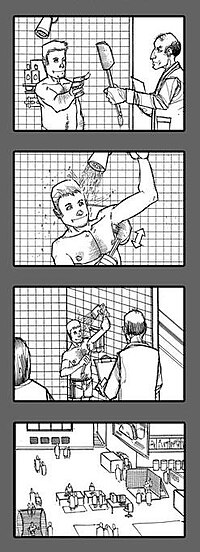
A storyboard for an imagined television advert,
showing four shots.

showing four shots.
Diposting oleh
Unknown
di
17.29
0
komentar
Kirimkan Ini lewat Email
BlogThis!
Bagikan ke X
Berbagi ke Facebook

Label:
Produktif
Rabu, 17 Oktober 2012
Sound
NEVER forget
that the piece you are preparing is an audio-visual production. Note
that audio comes before visual. It is absolutely vital that you get
the sound right for your video - without good sound, your work will look amateurish
and sloppy. A slick soundtrack can often hide the cracks in your images.
Therefore you need to plan your sound just as carefully as you plan
your images.
If your audience is viewing your work via YouTube, the image
might be reduced to a couple of inches wide, but the sound will be as
big and powerful as their computer speakers - get that to work in your
favour, not against you. Video produced for handheld mobile devices
needs excellent sound to enhance the storytelling, as images are so
small. Sound can help you keep your audience's attention.
There are several different sorts of sound that you can use. Using computer editing software, you can layer them in, adjust volume and sync images to particular sounds. Use 'J-cuts', where you lay in a couple of seconds of sound from one clip over the end of the one before, thus leading the audience into the visuals. You can also use a sound bridge to connect different sequences of images. Some sound you will record using your camera, other sound will come from other sources. Be inventive!
There are several different sorts of sound that you can use. Using computer editing software, you can layer them in, adjust volume and sync images to particular sounds. Use 'J-cuts', where you lay in a couple of seconds of sound from one clip over the end of the one before, thus leading the audience into the visuals. You can also use a sound bridge to connect different sequences of images. Some sound you will record using your camera, other sound will come from other sources. Be inventive!
Diposting oleh
Unknown
di
22.55
0
komentar
Kirimkan Ini lewat Email
BlogThis!
Bagikan ke X
Berbagi ke Facebook

Label:
Produktif
Kekkei Genkai (Naruto)
 |
| Kimimaro using his kekkei genkai. |
Diposting oleh
Unknown
di
21.58
0
komentar
Kirimkan Ini lewat Email
BlogThis!
Bagikan ke X
Berbagi ke Facebook

Label:
Anime
Haki (One Piece)
Haki (覇気 Haki, literally meaning "Ambition") is a mysterious power that is found in every living being in the world.
It is not that different from the normal senses. However, most people
do not notice it or fail to awaken it. Broadly, there are two types of
Haki common to everyone, given the proper training; however, there is a
third type that only a certain group of "chosen ones" are said to
possess. In simple terms, Haki is an ability to sense spiritual energy and overpower enemies.
 |
| Silver Rayleigh - Haki User |
Diposting oleh
Unknown
di
21.23
0
komentar
Kirimkan Ini lewat Email
BlogThis!
Bagikan ke X
Berbagi ke Facebook

Label:
Anime
Sea Kings (One Piece)
Sea Kings (海王類 Kai Ō Rui, literally translated as "Sea King Species"; known as Neptunians in the English manga) are sea creatures which are generally much larger than normal sea creatures. They are found in great numbers along the Calm Belt around the Grand Line, although in rare occasions they can be found in other places throughout the world.
 |
| Sea Kings |
Diposting oleh
Unknown
di
20.50
0
komentar
Kirimkan Ini lewat Email
BlogThis!
Bagikan ke X
Berbagi ke Facebook

Label:
Anime
Dragons (Fairy Tail)
Dragons (ドラゴン Doragon) are extremely powerful and intelligent creatures that live in Earth Land.
 |
| Dragon |
Diposting oleh
Unknown
di
20.34
0
komentar
Kirimkan Ini lewat Email
BlogThis!
Bagikan ke X
Berbagi ke Facebook

Label:
Anime
Brook (One Piece)
Brook (ブルック Burukku) is the musician of the Straw Hat Pirates. He is a skeleton the Straw Hats found on board a ghost ship after drifting into the Florian Triangle. He is a Devil Fruit user who ate the Yomi Yomi no Mi
and is an undead being brought back into a pseudo-immortal state
because of its powers. He is the ninth member of the Straw Hat crew and
the eighth to join Luffy's crew.
He is also one of the two swordsmen onboard their current ship with the
other being Zoro. He fills the role of the long-awaited musician that
Luffy wanted for his crew since his journey began. He has a bounty of  33,000,000.
33,000,000.
 |
| Brook |
Diposting oleh
Unknown
di
19.03
0
komentar
Kirimkan Ini lewat Email
BlogThis!
Bagikan ke X
Berbagi ke Facebook

Label:
Anime
Franky (One Piece)
Franky (フランキー Furankī) is the shipwright for the Straw Hat Pirates. He is a 36 year old cyborg from Water 7 and was introduced in the story as the leader of the Franky Family, a group of ship dismantlers. He was originally named Cutty Flam until he threw away his original name for his nickname per the request by Iceburg to hide his identity. Franky and his followers were originally introduced as antagonists of the Water 7 Arc
against the Straw Hats until circumstances forced them to become
allies. Per the request of the Franky Family, Franky was allowed to join
the Straw Hats to fulfill his dream of creating and riding a ship
capable of circum-navigating the world. He is the eighth member of the
Straw Hat crew and the seventh to join Luffy's crew. He is also the second member to have been a former antagonist (the first being Nico Robin). He has a bounty of  44,000,000. He is originally from South Blue which he left 32 years ago (post-timeskip) as a kid of four years of age.
44,000,000. He is originally from South Blue which he left 32 years ago (post-timeskip) as a kid of four years of age.
 |
| Franky |
Diposting oleh
Unknown
di
18.58
0
komentar
Kirimkan Ini lewat Email
BlogThis!
Bagikan ke X
Berbagi ke Facebook

Label:
Anime
Nico Robin (One Piece)
Nico Robin (ニコ・ロビン Niko Robin) is the archaeologist of the Straw Hat Pirates. She is originally introduced as the Vice President of Baroque Works known as Miss All Sunday before joining up with the Straw Hats. She is the seventh member of the crew, the sixth to join, and (including Nami), is also the second to rejoin, doing so near the end of the Enies Lobby Arc. Robin is also the first member to have been a former antagonist. She ate the Hana Hana no Mi. During the Post-War arc, she became involved with the Revolutionaries for two years. Her dream is to find the Rio Poneglyph which tells the True History. She has a bounty of  80,000,000.
80,000,000.
 |
| Nico Robin |
Diposting oleh
Unknown
di
18.54
0
komentar
Kirimkan Ini lewat Email
BlogThis!
Bagikan ke X
Berbagi ke Facebook

Label:
Anime
Tony Tony Chopper (One Piece)
Tony Tony Chopper is the doctor of the Straw Hat Pirates. Chopper is a reindeer that ate a Devil Fruit called the Hito Hito no Mi. He comes from Drum Island, which makes him the only member of the Straw Hat Pirate Crew who was born on the Grand Line.
He is the sixth member of the crew and the fifth to join Luffy, as well
as being the youngest member on board. He has a bounty of  50 due to being mistaken for the crew's pet.
50 due to being mistaken for the crew's pet.
 |
| Tony Tony Chopper |
Diposting oleh
Unknown
di
18.50
0
komentar
Kirimkan Ini lewat Email
BlogThis!
Bagikan ke X
Berbagi ke Facebook

Label:
Anime
Sanji (One Piece)
Sanji is a pirate and the chef of the Straw Hat Pirates. He is the fifth member of the crew and the fourth to join. Since he was born in North Blue, he is the first Straw Hat not to originate from East Blue. His dream is to find the rumored All Blue, which is where East Blue, West Blue, North Blue, and South Blue meet along with their wildlife, a chef's paradise. He has a bounty of  77,000,000.
77,000,000.
 |
| Sanji |
Diposting oleh
Unknown
di
18.47
0
komentar
Kirimkan Ini lewat Email
BlogThis!
Bagikan ke X
Berbagi ke Facebook

Label:
Anime
Usopp (One Piece)
Usopp (ウソップ Usoppu) was born in Syrup Village. He is the sniper of the Straw Hat Pirates and former Captain of the Usopp Pirates.
When Usopp was first introduced, he was often (comically) labeled as
the "Liar" of the Straw Hat Pirates, due to the "Uso" (うそ) in his name
meaning "lie" or "falsehood". He was first mentioned by Yasopp, his father. He is the fourth member of the crew, the third to join, and, including Nami, also the third to rejoin, doing so at the end of the Post-Enies Lobby Arc. He is known with a bounty of  30,000,000 on his head by his alias and alter-ego "Sogeking".
30,000,000 on his head by his alias and alter-ego "Sogeking".
 |
| Usopp |
Diposting oleh
Unknown
di
00.07
0
komentar
Kirimkan Ini lewat Email
BlogThis!
Bagikan ke X
Berbagi ke Facebook

Label:
Anime
Nami (One Piece)
Nami is a pirate and the navigator of the Straw Hat Pirates. She is officially the third member of the crew after Arlong's defeat, and the second to join. She briefly betrays the crew during the Baratie Arc and rejoins at the end of the Arlong Arc after her past and true intentions are revealed. She has a bounty of  16,000,000.
16,000,000.
 |
| Nami |
Diposting oleh
Unknown
di
00.04
0
komentar
Kirimkan Ini lewat Email
BlogThis!
Bagikan ke X
Berbagi ke Facebook

Label:
Anime
Selasa, 16 Oktober 2012
Roronoa Zoro (One Piece)
Roronoa Zoro (ロロノア・ ゾロ Roronoa Zoro) is a pirate, former bounty hunter, and one of the main protagonists of One Piece.
He is the first member to join the Straw Hat Pirates and to date is considered the largest threat and most dangerous member in the crew after Luffy. His fame as a master swordsman and his great strength, along with the actions of his captain, sometimes leads others to believe that he must be the true captain and is widely thought to be the first mate by those outside the crew. He is one of the top three fighters in the crew, and his dream is to become the greatest swordsman in the world. Zoro is labeled as one of "The Eleven Supernovas", the eleven rookie pirates with bounties over 100,000,000 to have reached the Red Line, with a current bounty of
100,000,000 to have reached the Red Line, with a current bounty of  120,000,000.
120,000,000.
He is the first member to join the Straw Hat Pirates and to date is considered the largest threat and most dangerous member in the crew after Luffy. His fame as a master swordsman and his great strength, along with the actions of his captain, sometimes leads others to believe that he must be the true captain and is widely thought to be the first mate by those outside the crew. He is one of the top three fighters in the crew, and his dream is to become the greatest swordsman in the world. Zoro is labeled as one of "The Eleven Supernovas", the eleven rookie pirates with bounties over
 |
| Roronoa Zoro |
Diposting oleh
Unknown
di
23.59
0
komentar
Kirimkan Ini lewat Email
BlogThis!
Bagikan ke X
Berbagi ke Facebook

Label:
Anime
Monkey D. Luffy (One Piece)
Monkey D. Luffy (モンキー・D・ルフィ Monkī D. Rufi) is a pirate and the main protagonist of the anime and manga, One Piece. He is the son of the Revolutionary Army's commander, Monkey D. Dragon, the grandson of the famed Marine, Monkey D. Garp, the foster son of a mountain bandit, Curly Dadan, and the adopted brother of the late "Fire Fist" Portgas D. Ace and Sabo. His life long goal is to become the Pirate King by finding the legendary treasure left behind by the Pirate King, Gol D. Roger. He believes that being Pirate King means one has the most freedom in the world. He has eaten the Gomu Gomu no Mi. As the founder and captain of the Straw Hat Pirates, he is the first member that makes up the crew, as well as one of its top three fighters.
 |
| Monkey D. Luffy |
Diposting oleh
Unknown
di
23.55
0
komentar
Kirimkan Ini lewat Email
BlogThis!
Bagikan ke X
Berbagi ke Facebook

Label:
Anime
Straw Hat Pirates (One Piece)
The Straw Hat Pirates (麦わらの一味 Mugiwara no Ichimi) are a pirate crew that started in East Blue. They are the main focus and heroes of the anime and manga One Piece, and are led by the main protagonist, Monkey D. Luffy. The "Straw Hats" are named after Luffy's signature straw hat that was given to him by Red-Haired Shanks, and are first referred to as the Straw Hat Pirates by Smoker in Alabasta. The crew sailed on the Going Merry, their first official Straw Hat ship, up until the Water 7 Arc. After the Enies Lobby Arc, they obtain a new ship called the Thousand Sunny. The Straw Hats currently consist of nine members whose combined bounties equal  800,000,050.
800,000,050.
Following the events on the Sabaody Archipelago, all nine members were separated from one another. For two years, they trained in relatively isolated locations, becoming stronger for the sake of helping each other.
Following the events on the Sabaody Archipelago, all nine members were separated from one another. For two years, they trained in relatively isolated locations, becoming stronger for the sake of helping each other.
 |
| Straw Hat Pirates |
Diposting oleh
Unknown
di
23.47
0
komentar
Kirimkan Ini lewat Email
BlogThis!
Bagikan ke X
Berbagi ke Facebook

Label:
Anime
Sharingan (Naruto)
The Sharingan (写輪眼; Literally meaning "Copy Wheel Eye", Meaning (Viz) "Mirror Wheel Eye") is a dōjutsu kekkei genkai, which appears in some members of the Uchiha clan. It is one of the Three Great Dōjutsu (三大瞳術, San Daidōjutsu; Literally meaning "Three Great Eye Techniques"), along with the Byakugan and the Rinnegan. The Sharingan is also called "Heaven's Eye" (天眼, Tengan), because of the many abilities it grants the user.
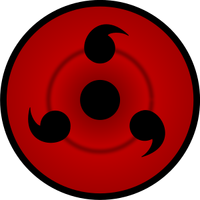 |
| Sharingan |
Diposting oleh
Unknown
di
21.33
0
komentar
Kirimkan Ini lewat Email
BlogThis!
Bagikan ke X
Berbagi ke Facebook

Label:
Anime
Rinnegan (Naruto)
The Rinnegan is reputed as the most exalted eyes amongst the Three Great Dōjutsu (三大瞳術, San Daidōjutsu;
Literally meaning "Three Great Eye Techniques"). It is characterised by
its ripple-like pattern which spreads over the eyeballs, with light
purple irides and sclerae.
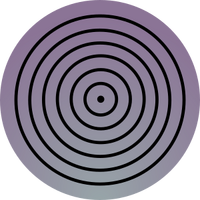 |
| Rinnegan |
Diposting oleh
Unknown
di
21.25
0
komentar
Kirimkan Ini lewat Email
BlogThis!
Bagikan ke X
Berbagi ke Facebook

Label:
Anime
DF Type Logia (One Piece)
Logia (自然系(ロギア) Shizenkei [Rogia], literally translated as "Nature System") is one of the three types of Devil Fruit.
It is characterized by giving its user the ability to turn into a
natural element or force of nature. Logia Devil Fruits are considered
the most powerful as well as the rarest of the types of Devil Fruit as a
whole.
 |
| Yami Yami no Mi |
Diposting oleh
Unknown
di
21.03
0
komentar
Kirimkan Ini lewat Email
BlogThis!
Bagikan ke X
Berbagi ke Facebook

Label:
Anime
DF Type Zoan (One Piece)
Zoan (動物系(ゾオン) Dōbutsukei [Zōn], literally translated as Animal System) is one of the three types of Devil Fruit. This type of fruit allows the user to transform into another species and inter-species hybrid forms at will. Zoan types are especially effective in close combat.
 |
| Ushi Ushi no Mi, Model: Giraffe |
Diposting oleh
Unknown
di
20.52
0
komentar
Kirimkan Ini lewat Email
BlogThis!
Bagikan ke X
Berbagi ke Facebook

Label:
Anime
DF Type Paramecia (One Piece)
Paramecia (超人系(パラミシア) Chōjinkei [Paramishia], literally translated as "Superhuman System") is one of the three types of Devil Fruit.
These fruits give the users a "super-human" power which can affect
their body, manipulate the environment or produce some kind of
substances. In general, Paramecia Devil Fruits are fruits that give
their users powers other than transforming into elements like Logias, or transforming into animals like Zoans.
Though they do not include powers that allow elemental or animal
transformations, some of them are capable of other forms of
transformations. This is the most common class of Devil Fruits. In the edited dub, this class is called Paramythia.
 |
| Awa Awa No Mi |
Diposting oleh
Unknown
di
20.43
0
komentar
Kirimkan Ini lewat Email
BlogThis!
Bagikan ke X
Berbagi ke Facebook

Label:
Anime
Mangekyō Sharingan (Naruto)
The Mangekyō Sharingan (万華鏡写輪眼; Literally meaning
"Kaleidoscope Copy Wheel Eye"), noted to be the "heavenly eyes that see
the truth of all of creation without obstruction", is an advanced form of the Sharingan that has only been activated by a handful of Uchiha. It was also awakened by Kakashi Hatake — a non-Uchiha.
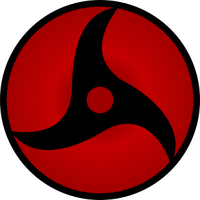 |
| Itachi's Mangekyō Sharingan |
Diposting oleh
Unknown
di
19.35
0
komentar
Kirimkan Ini lewat Email
BlogThis!
Bagikan ke X
Berbagi ke Facebook

Label:
Anime
